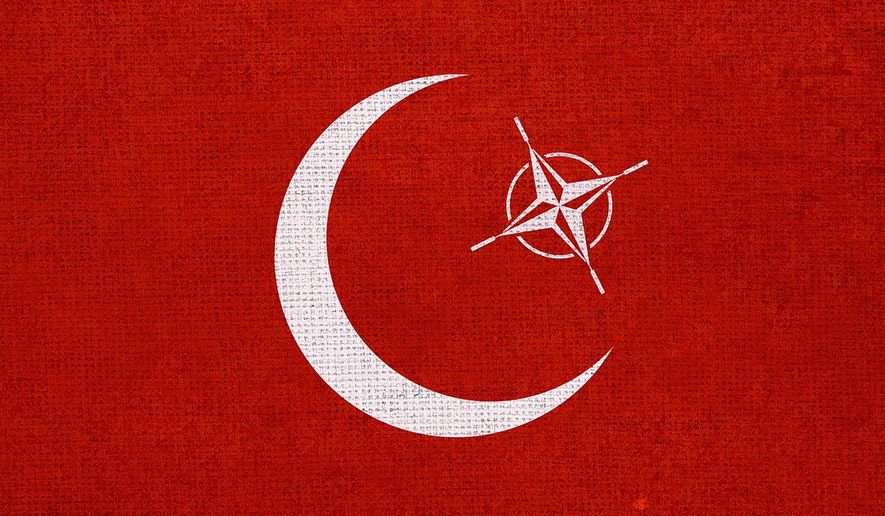OPINION:
President Trump found NATO wanting. Then true to form, he acted like a CEO, not a president, serving notice that things had to change, or else. The “or else” he left undefined, creating angst among politicians and policy elites who, sensing their own failures, chose to focus on his manners not his message. Mr. Trump’s poor political decorum notwithstanding, his policy judgment is right. NATO has to change.
NATO is at risk, not from without, but from within. Vladimir Putin’s geopolitical maneuvering is cause for concern to be sure, but the real danger comes from the erosion of NATO’s core values, and the rise of a dictator within its ranks. They pose a far greater risk than Russia’s current meddling.
The North Atlantic Treaty commits every NATO member to “the principles of democracy, individual liberty, and the rule of law,” but a growing number of NATO autocrats ignore these core values. Political expression in particular has taken a beating. Every European country but two is less tolerant of opposing viewpoints today than it was in 2013.
Autocrats shut down public debate, and bureaucrats harass anyone who disagrees. It’s happened in Romania, Lithuania, Poland, Bulgaria, Hungary and the U.S., where the IRS subjected conservative NGOs to questionable tactics. Political and media ideologues use identity politics and political correctness to facilitate the crackdowns by condemning as hateful any views with which they disagree.
We’ve forgotten the Helsinki Accords, and their making respect for individual liberty a requirement for international legitimacy. Dictators still arrest, and imprison, and torture, to be sure, but today they must have a whiff of freedom about them to avoid the world’s condemnation. Helsinki’s effect helped defeat the Soviet Union. It is why the world condemns ISIS. And it is why Ankara is pushing back against reports of Turkey’s gulag.
Every member’s protection under Article V should depend on its commitment to NATO’s core values, but the alliance is giving everyone a pass, honoring its reason to exist more in the breach. If the trend continues, then NATO will become a mutual defense pact for dictators posing as democrats.
No NATO member has spurned its values and security interests more flagrantly than Turkey. President Erdogan used Vladimir Putin’s playbook to establish himself as an equally dominant and despotic ruler in Turkey. Democracy is staggering under government oppression, oligarchs rule the economy, and Erdogan sycophants maintain a cult of personality around him. Turkish media calls him the “Great Master,”and he lives sultan-like in a 1,100 room “White Palace” he built for himself as president.
Turkey’s drift from freedom accelerated after the failed military coup in July 2016. Mr. Erdogan launched a continuing purge that has so far snared about 118,000 Turks, at least 50,000 jailed, and the rest suppressed with various state sanctions. The stories coming out of Turkey are horrific; people disappearing, children and spouses arrested to punish political opponents, mass arrest of journalists, criminal charges based on spurious allegations that remind one of the Soviet Union’s darkest days. While Mr. Erdogan Putinized his country’s democracy, NATO remained silent.
Turkey ignores NATO’s security interests as well. For years, aid, weapons, and volunteers flowed across Turkey’s southern border to ISIS, and ISIS oil flowed out. A train of Hezbollah-bound, Iranian-supplied rockets derailed in southeast Turkey in 2007. Police stopped Turkish intelligence service trucks carrying mortars, artillery shells, and ammunition to al Qaeda near the Syrian border in 2014. Mr. Erdogan’s response? Arrest the police and claim it was humanitarian aid. When newspaper editors published photos disproving his claim, they were also arrested.
The Turkey that protected NATO’s flank for 50 years is gone, replaced by a replica of Vladimir Putin’s Russia. Mr. Erdogan’s silent supervision of peaceful protesters beaten on Washington’s streets by his armed security thugs speaks volumes about his respect for NATO’s values. The alliance should not accept the risk of war for an “ally” with such values, nor should the U.S. sell Turkey sophisticated F35A fighter aircraft for him to use against our Kurdish allies.
• Bruce M. Lawlor, a retired U.S. Army major general, is a former member of the Homeland Security Advisory Council and chief of staff of the Department of Homeland Security.




Please read our comment policy before commenting.